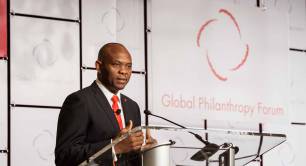10 insights on aid, impact and innovation from Sankalp Africa
After braving the infamous Nairobi traffic, 450 delegates from 25 countries arrived at the Sankalp Africa Summit wondering what is really happening in Africa around innovation and investment.
There were three key focus areas:
- Value chains and collaboration across sectors
- Financing for small, high-impact enterprises
- Tangible opportunities for India - Sub Saharan Africa partnerships, building on shared obstacles and learnings.
I found myself in a diverse crowd of development finance institutions, foundations, multinational corporates, social entrepreneurs, nonprofits, foundations, angel investors, institutional investors, intermediaries and government officials, taking an ecosystem view on inclusive development in Africa.
Here’s my Top 10 from a crazy few days:
1. Corporates are venturing for impact. Corporates had a lot to say in Nairobi, and it was not PR or CSR. They were explaining their need and desire for partnerships on specific social and environmental challenges – and their willingness to scale these solutions through more engagement than throwing money at them. They are ready to invest in, spin-in, spin-out, contract and promote these ideas through their marketing and distribution channels, because they recognize that impact at scale is good for business and good for the world.
2. Technology is awesome; but let’s not forget the non-tech solutions. From the development finance institutions (DFIs) to the angel investors, the awe and expectation around the impact of digital technology in developing markets were clear, but a few entrepreneurs reminded them to pay attention to the less shiny, but equally necessary, non-tech approaches to social impact. The winner of the Sankalp Africa Awards was Continental Renewable Energy, which manufactures eco-friendly plastic fencing posts from recycled plastics. Not an app – but a high-impact, scalable solution.
3. African angel investors are petulant about the prevalence of grants in Africa. They believe the amount of money given to African initiatives, without any expectation of return, is distorting their investment opportunities – because who would want money with strings attached, if they can get money for free? There was even a call to rid the continent of all grant capital once and for all.
4. Impact measurement – for who? In a roundtable on impact measurement for fund managers, we reviewed the wide variety of measurement tools available. But the conversation quickly turned to a debate between social entrepreneurs and investors on who’s actually using the data anyway. Fund managers confessed to be collecting it out of obligation, entrepreneurs were collecting across different systems due to investor requests – and beneficiaries were rarely ever seeing the value of the analysis.
5. It’s time for the business plan to be the impact plan. We need high-impact enterprise in Africa; but not if the solutions are built to fail. We heard constant warnings about the need for truly market-based impact – balanced with solid business sense.
6. Traditional NGOs and international aid organizations are cluing into impact investment. Aid organizations were very present in Nairobi, alongside development finance institutions, to listen and learn, but with a lot of reservations about how to get involved. For starters, probably recognizing the reasons this mockumentary called The Samaritans just launched, highlighting the absurdities of the international aid sector?
7. Stop the premature celebrating & constant overpromising. We are all in this to work ourselves out of a job; but let’s be sure when we lose our jobs, it’s because we’ve met our goals, not because we’ve claimed to lift the world out of poverty before we actually have.
8. Pay attention to the government. While impact investors and entrepreneurs alike would like to believe we can save the world without bothering with the policy inertia, there were many case studies on the need for appropriate licensing rules, procurement channels, investment incentives and skill-building initiatives led by the government.
9. Where’s the business case for integrity? In the African context, it must be built and rewarded. And along the same lines, it was often mentioned that financial freedom is nothing in a world without prosperity and freedom – an obvious, yet little acknowledged, issue in the global impact investment conversations.
10. Keep stretching. The reason everyone was in Nairobi at Sankalp was to pioneers and scale new high-impact, market-led solutions. Let’s not fall back into change-as-usual, old habits of a dysfunctional system, and keep stretching towards breakthrough.
Photo credit: Guilherme Jofili



